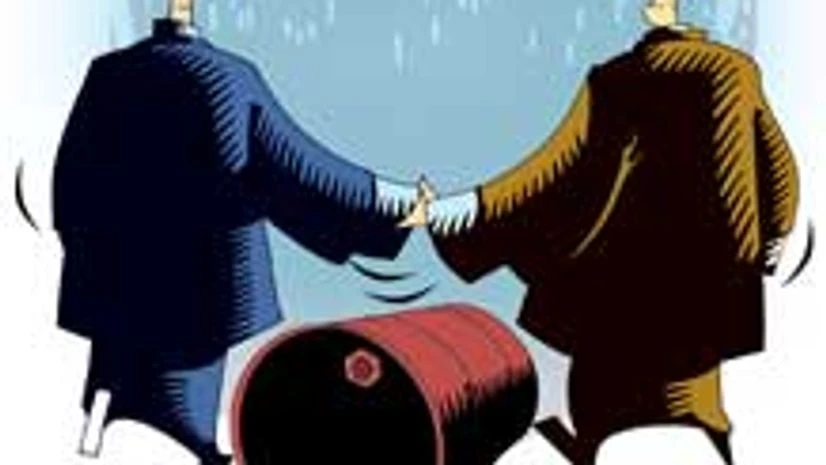India's top political parties are taking aim at a six-decade old practice of collusion among traders at produce markets that policy makers say helps fuel Asia's highest inflation.
At Mumbai's Vashi market, middleman Nitin Parakh put a towel over his hand last month as he began an onion auction. Buyers drifting through piles of onions placed bids by reaching under the towel and squeezing his hand: The thumb, middle, ring and pinkie fingers each count for Rs 10 ($0.16), while the index finger has a value of Rs 100.
"We know secret bidding is illegal and we should actually do open auctions," said Parakh, one of about 450 traders licensed to sell onions and potatoes at Vashi, the largest wholesale market in Mumbai, a city of about 18 million people. "This practice has been in vogue for many, many years."
More From This Section
"Secret bidding fuels inflation as there is collusion between the middlemen and wholesalers: They pay lower prices to farmers and sell it at higher price to retailers," said A V Manjunatha, who co-authored a report for the government on onion price manipulation in 2012. "The problems are known, and the solutions are also known: you need to have political will to bring about the changes."
Rate increases
The central bank in January cited agriculture market cartels for exacerbating price spikes as Governor Raghuram Rajan raised the benchmark repurchase rate to eight per cent. India's consumer-price inflation of 8.1 per cent is the fastest among 18 Asia-Pacific economies tracked by Bloomberg.
Rajan will leave the key rate unchanged at an April 1 policy review, according to 18 of 19 analysts in a Bloomberg News survey. One predicted an increase to 8.25 per cent.
A central bank panel in January called for consumer-price gains to slow to six per cent by January 2016. Food prices make up 50 per cent of the Consumer Price Index (CPI) basket, compared with 14 per cent in the US and 24 per cent in Brazil.
Prime Minister Manmohan Singh's ruling Congress party targeted the rackets in December after it lost four of five state elections to the BJP, following a jump in onion prices. Government officials accused middlemen of hoarding as prices quadrupled while heavy rains crimped supplies.
Direct purchases
Rahul Gandhi, who is leading the party's bid to extend its decade-long rule after Singh said he wouldn't seek a third term, ordered rule changes to enable buyers to directly purchase from farmers in 12 states under his control. Voting starts on April 7 and results will be known on May 16.
The BJP, which leads in opinion polls, will change the current system to benefit farmers more than middlemen, spokesman Prakash Javadekar said by phone. Narendra Modi, the party's prime minister candidate, said in January he'd establish a real-time database to track agriculture prices.
"We need to remove all the geographical restrictions and make the system more transparent so that the farmer gets his due," Javadekar said.
The current system dates back to the 1950s, when state governments - which have constitutional powers to regulate farming - sought to prevent farmers in remote areas from exploitation by setting up markets with licensed traders and transparent sales.
Trader monopolies
Over time, the licensing system turned into a monopoly in many states, with traders organising to prevent new entrants and stifle competition, according to an Agriculture Ministry report published last year.
"There are at least three to four stages before the final produce reaches the consumers," said Ashok Gulati, a former chairman of the Commission for Agricultural Costs and Prices, a body that recommends minimum guaranteed farm prices to the government. "There is rent-seeking happening at every stage."
While some of India's 28 states - including Uttarakhand and Himachal Pradesh - have already changed laws to allow farmers to directly sell fruits and vegetables to retailers, others have resisted Gandhi's proposed changes. The process is stalled in Maharashtra, home to Vashi market in India's financial capital, where Congress has held power since 1999.
Middlemen resist
"There is resistance from traders as they are afraid they might lose their livelihood," said Deepak Taware, director of agriculture marketing in the Maharashtra government. "It looks like it won't happen very soon."
Parakh, the Vashi trader, is confident the system won't change. He paid farmer Bajirao Madhav Rs 7 a kg for his onions - three times less than they fetched in a retail market three kms away.
"This system is completely in the hands of middlemen," said Madhav, who said he must take whatever price is offered because he travelled a long distance. "We work hard for months to produce and we have to rely on them as we have no other guaranteed option to sell our produce."
"It will be very, very suicidal for any party to change the system unless they build a lot of infrastructure to enable farmers to sell their produce," Parakh said, without disclosing the commission he charges. "The political parties also know this - that's why they are not in a hurry."

)
